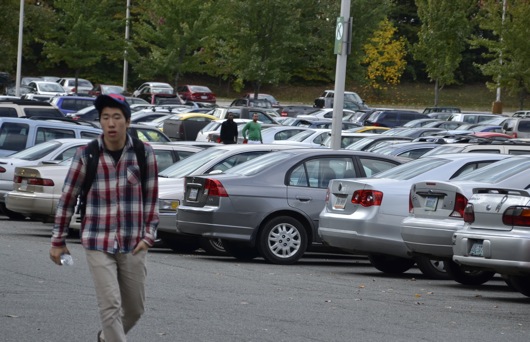Economics major calls transportation plan ‘bad incentive structure,’ organizes protest at Kiosk B

Mason student Songseoub Kim walks through Lot K on Monday morning. Permit prices for the lot are expected to change as the parking system becomes zone-based, one of many changes in the Master Transportation Plan. (Jake McLernon)
A few dozen students plan to attend a protest of George Mason University Parking and Transportation Services on Tuesday, taking issue with planned changes to parking permit price and space availability for future parking and transportation on the Fairfax Campus.
Cole Terlesky, a junior economics major who organized the “Protest GMU parking plans” event through Facebook, told Connect2Mason Monday that the main goal of the "protest" is to collect emails from those who are concerned with current and future plans for parking. For the event, Terlesky created a three-point resolution opposing Parking and Transportation's Transportation Master Plan, a 161-page document created last April that outlines suggested action for parking- and transportation-related construction, policy and education of services during the university’s expected growth over the next 10 years.
The resolution on the Facebook event specifically opposes prioritization of reducing single occupancy vehicles, encouraging public transportation and increasing the cost of permits. It also calls for a change in favor of “the more Mason friendly principles of openness and fairness,” challenging the use mechanisms of feedback for the commuting community at Mason.
“Every student that can’t afford or can’t find a parking space has had the gate to a college education slammed shut on their face,” says the More Info section of the Facebook event for the protest, scheduled for the Johnson Center’s Kiosk B.
According to Josh Cantor, the director of Parking and Transportation who has actively responded to claims on the event and wall posts as "Gmu Parking Transportation," many of the statements posted online are untrue. In addition to identifying the need for more parking decks, the plan recommends a 10 percent reduction in single occupant vehicles to help offset future parking losses and “not force us to have to build more expensive parking than we will already have to,” according to Cantor. Reducing amount of parking that needs to be built in the future is desirable from a land-use perspective as well as a financial perspective, as permit fees would have to cover the cost of each additional deck, said Cantor.
“My guess is [Terlesky] and a few others think that by supporting a goal to reduce the number of single occupant trips to campus we aren't caring about commuters, which is just untrue,” Cantor said. “My job, [however], is to balance a lot of interests and needs from a variety of perspectives.”
A committee consulted during the plan’s creation had around 30 stakeholders, according to Cantor. The document says that those in the outreach process comprised of faculty senate, staff senate, Student Government representatives and representatives from major departments and venues across campus, as well as representatives from City of Fairfax, Fairfax County, and Virgina Department of Transportation.
Cantor said he also recalls four town halls on the subject, two on campus and two with the city and county held at City Hall. Focus groups for resident students, athletics, student government, and other groups also occurred, according to Cantor.
“The plan which I have emphasized repeatedly does call for building future parking to replace parking lost due to future building construction – already approved by the Board of Visitors on the campus master plan -- as well as compensating for future growth,” Cantor said.
Parking demand is expected to grow as the university expands. The administration projects enrollment to increase by 20 percent, coupled with a 20 to 25 percent increase in on-campus housing, according to statistics in the Master Transportation Plan. Goals such as reducing single occupancy vehicles, increasing the use of public transit and switching the general lot permits to zone-based system would reduce an expected 5,893 necessary parking spaces to 3,057 necessary spaces because of removed surface lots in future building plans.
Recognizing he doesn’t have any special knowledge of parking or how it should alternatively be handled, Terlesky called the plan a “bad incentive structure.”
“I don't think the organization tasked with providing parking services should simultaneously be the organization responsible for reducing the demand for those parking spaces,” Terlesky said. “They are contradictory goals.”
No changes will be made to the published document, according to Cantor. In some senses, however, Cantor said he calls it a "living" document.
“I welcome feedback and questions,” Cantor said. “But like in any process, [we] also need to be able to have people who will listen as we did go through a very extensive, involved process to formulate the plan, soliciting a year's worth of feedback.”
Cantor said he would “gladly attend” any forums held with students whose information is collected Tuesday.
According to Terlesky Monday, future plans have yet to be decided for the group and any emails collected at the kiosk.
